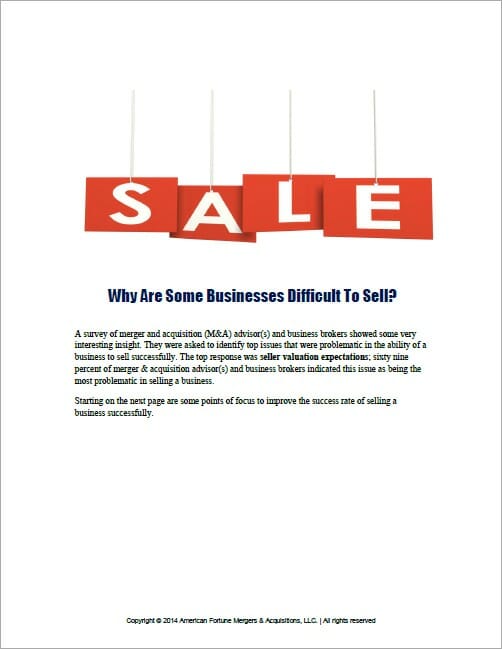Sell a Company, Nine Things you Need to Know
To Sell a company required some planning and preparation, it’s also very helpful to learn from the lessons of others who sold their businesses. Since the sale of a business is often a once in a life event, a business owner does not have the luxury of getting a second chance. Employees, customers, suppliers and others are also very dependent on a successful sale and ownership transfer of the business. Of very high importance is the merger & acquisition expertise and experience to maximize price and terms in selling of corporation.
I have been involved in approximately 300+ merger and acquisitions, most deals were between $1/2 million and $5 million in profit. I have scars from deals that took blood, sweat, and tears to complete. I also learned many humbling lessons and burned the midnight working and crafting winning negotiation strategies or deal structure for my clients. After 22 years of merger and acquisition work, I still learn something new or experience spontaneous ideas to solve a problem during a deal impasse.
Here is the best of what I have learned:
1) Use Time as an Ally
Most business endeavors are easier and better when the time is on your side and or time is not of the essence. The opposite is also true, it is difficult to optimize the results of a business sale if you compress the time available to fit and work on all of the required business tasks as well as business sale tasks.
It is prudent to begin working on selling a company well before the planned sale. Very often it takes years to create the best systems and procedures in a business such as proper accounting systems, diversity in customer concentration, quality control, good management team, and finding the best merger and acquisition firm and or advisor. Without proper preparation and the use of a skilled merger and acquisition advisor, business owners should anticipate spending approximately fifty percent of their time on the sale process of their corporation.
2) Obtain Expert Assistance When Selling my Company
A business seller will be advantaged, financially, with time, and emotionally, when they hire a merger and acquisition advisor to work on the sale of their business. The payoff will come in multiple areas. They save the seller tremendous time in seeking, marketing and qualifying buyers, preparing documents, and providing a buffer to allow a business owner to stay on track during the sale process. The merger and acquisition advisor has experience and expertise in navigating the sale process, due diligence, negotiation and deal structuring. Also, merger and acquisition advisors can broaden the net of potential buyers, which is very important to maximizing the highest probability of a sale and highest sale price.
3) Orderliness is Godliness
Appearances do matter in selling a company. The organization and completeness of business records, reports, files and processes can have an impact on how potential buyers view a business for sale. First impressions make a big impact on potential buyers since they are operating with very little information so every little thing leaves a positive or negative impression. Being organized communicates to buyers that the business is a well-managed. Being organized really helps when the time comes to produce procedures, systems, and documents to buyers during the due diligence stage.
4) GAAP Accounting
In the sale of a company it is important that the business owner has some grasp of understanding of GAAP accounting and EBIDTA rules. Understanding the basics of GAAP (Generally Accepted Accounting Principles) and EBIDTA (Earnings Before Interest Depreciation Taxes and Amortization is very helpful at different phases of the sale process. On several occasions, I have had business owners tell me that “cash is the only thing that matters”, or that “we have our own unique way of doing accounting”. That may work ok for the company internally, but if the accounting does not follow standard GAAP than buyers and their advisors will not understand a homemade accounting system. It is imperative that the financial statements are presented using GAAP. Additionally, it is prudent to engage a CPA firm to do a review, an audit, or a Quality of Earnings analysis to better prepare the business for sale and to create more trust of the financial statements represented by the company.
Proper Treatment of Cash in GAAP accounting
Some of the main pitfalls can be scenarios where the business receives cash before delivering the product or service. Many business owners may consider this cash to be revenue. In GAAP accounting this type of cash is not considered revenue until the product or service has been rendered or delivered. This type of treatment of cash can make the company’s revenue appear substantially different. These types of issues can really hurt the credibility of a company more when the financial results are significantly different when prepared under GAAP accounting rules.
5) Assigning Key Contracts and Leases Assigned to the Buyer(s)
As a Merger & Acquisition Advisor, I know from experience that landlords can be difficult and arrogant. A landlord can hold up the selling of a corporation. Many delays can occur when a landlord will not assign the lease to the new owner or he is using this point of leverage to extract additional price hikes or new terms from the buyer. I recommend that you begin to review your key contracts and leases many months or years in advance of the sale and attempt to get them “assignable”, this will avoid being at the mercy of a landlord or key customer. These things happen all the time. Good planning will help minimize a business sale being held up by such factors.
6) Monogamy Happens at Different Stages of the Process for the Buyer and the Seller
In the initial phase of selling a company, the seller has more control and power since there are multiple buyers considering just one purchase. However, once the seller selects a buyer and signs a Letter of Intent or Offer to Purchase Agreement the seller becomes monogamous and loses some of the control and power. It is important for sellers to understand that there is still much that can distract or dissuade the buyer from this point forward. The due diligence needs to pass the buyers criteria. Although seemingly interested the buyer can become distracted with other deals, or other companies in their portfolio, or things or goals may change for the buyer. It’s not unusual for buyers (companies) to review and perform due diligence on twenty businesses before they make one acquisition. The seller and the merger and acquisition advisor should be wise to strategically woo the buyer into the deal.
Business Continuity is Important
It is important that the seller operate the business as if it will not be sold to assure that a buyer can sense that the business’s environment and forecast appear very healthy. It’s important to keep impressing the buyer with various elements of the business and understand that the buyer is not committed to the deal until business contracts are signed. It is important to note that at some point a seller needs to transition from an adversary to a partner with the buyer, the seller also needs to keep reinforcing the attractiveness of the business until the deal is completed.
7) A Deal is All About Fit and Timing
In selling a company successfully it involves numerous moving parts but selling a business is also a numbers game. It is vital to formulate a strategy for maximizing the chances that numerous buyers can be identified for whom the business would be a very good fit and the sale also in perfect timing with their acquisition goals. For some buyers for which it may be a good fit to acquire the business, the current time may be bad due to the buyer’s current focus on saving cash, raising money, short-term cash flow issues, or some executive management infighting. It is difficult to size up buyers since there are so many issues behind the scenes that affect how buyers behave, so it is difficult to figure out what is truly happening in their minds. The most prudent approach is to cast a wide net, determine who is interested and qualified, carefully choose and qualify the right buyers. To allow just any type of buyer to probe a business for sale is a mistake, it wastes a lot of time and compromises confidential information.
8) Everyone Goes off the Deep End Sometime During the Sale Process
In almost every business purchase and sale I have been involved I have seen the business owner go off the deep end. I find this emotion quite normal and may actually turn out to be a good thing, as it allows both parties and their advisers to step back out of the details and look at the big picture. It may also send a message to the buyer and their advisers that they have pushed too far and they need to pull back on their micro due diligence or price concessions. The due diligence, negotiation and deal structure can be a grueling and emotionally charged process for many owners when there is sometimes a moment when they question the transaction with the buyer at hand.
My recommendation is that when the business owner goes off the deep end they do it in a manner that is not a personal attack against the buyer. There is a professional way of breaking down without resorting to name calling or yelling. It is more prudent to direct one’s anger and frustration at issues, processes, and procedures rather than directly fault people. Outside of dishonesty, most people are trying their very best to do the right thing.
9) Control the Lawyers
In the sale and acquisition of businesses, it is difficult to fully avoid effects of the “tyranny of the experts”. For most business owners selling a company is a once in a lifetime event, therefore they feel the need to rely heavily on lawyers, accountants, and consultants. These professionals can be very helpful but with certain limitations. It is also important to not let them drive the process too much. Each one of them may have a temptation to overstep their areas of expertise; this is especially true with lawyers. As a business owner stay in control and do not allow others to make decisions for you, once you receive information and facts it is your call to make the decisions. As a business owner you have good business judgment to make the right decisions. If you have difficulty making a decision ask more questions or seek more information. Ultimately, you will need to make the business decisions about how to do the deal (is the lawyer trying to impress you with terms and conditions and or is he running up the meter?). There always comes a moment where everyone must tell his or her lawyer to back down and not to kill the deal with massive contract details or unreasonable terms and conditions. Your goals and your lawyer’s goals are not fully aligned. Remember, you will have to pay the lawyer whether the deal goes through or not.
For more information please contact American Fortune at 800-248-0615
How to Sell a Corporation | Business Valuation Services







